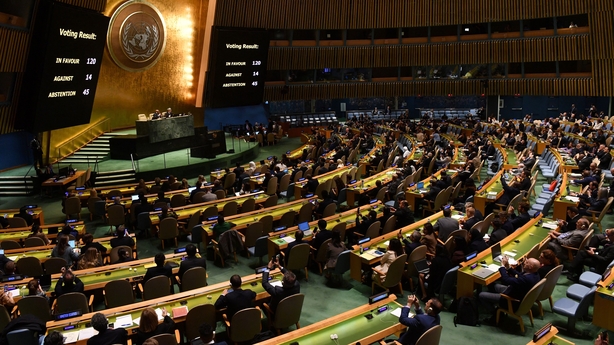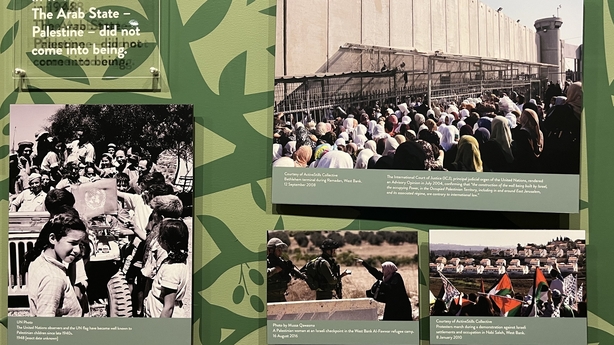A UN resolution calling for an immediate humanitarian truce and aid access to Gaza passed in the General Assembly yesterday afternoon, over the strongest objections from the member state of Israel.
An amendment proposed by Canada, to condemn the Hamas attacks on 7 October and call for the unconditional release of Israeli hostages, failed to be adopted.
The vote came hours after Israel had announced it would begin its ground invasion of Gaza overnight.
General Assembly resolutions, unlike those at the Security Council, are not legally binding.
But the 120 yes votes, including Ireland's, sent a powerful message opposing Israel’s bombardment of the Gaza Strip and what the UN Secretary General has condemned as the "collective punishment" of the Palestinian people.
The Israeli Ambassador, Gilad Erdan, expressed his outrage at the result calling it "a day of infamy" showing "the UN no longer holds even one ounce of legitimacy or relevance."
The vote came at the end of a week in which Israel’s long-standing fury with the UN, which is sees as biased against it, boiled over.
It all started when the UN Secretary General, António Guterres, addressed the Security Council on Tuesday morning.
Mr Guterres condemned the Hamas attacks on Israeli civilians.
Nothing could justify "the deliberate killing, injuring and kidnapping of civilians," he said.
He said it was also important to also recognise that the attacks by Hamas "did not happen in a vacuum."
"The Palestinian people have been subjected to 56 years of suffocating occupation," Mr Guterres said.
"They have seen their land steadily devoured by settlements, plagued by violence, their economy stifled, their people displaced, and their homes demolished," he told Council members.
Within minutes, the Israeli envoy to the United Nations reacted angrily to the Secretary General’s remarks saying that they amounted to a justification of terrorism.
Mr Erdan said later said the comments were an attempt at victim-blaming and were "a pure blood libel."
The Secretary General must resign immediately, Ambassador Erdan said.

The Israeli Foreign Minister, Eli Cohen, who was in New York for the Security Council meeting, abruptly cancelled his meeting with the Secretary General.
The row continued into a second day on Wednesday when the Secretary General emerged to clarify his remarks.
He said they had been misinterpreted and he was "shocked" because his condemnation of the 7 October attacks by Hamas had been "unequivocal," he said.
The Secretary General told reporters that he had been clear in his remarks to the Council that "the grievances of the Palestinian people cannot justify the appalling attacks by Hamas."
It was necessary, he added, to set the record straight out of respect for the victims and their families.
But it did not wash with the Israeli Ambassador, who reiterated his demand for Mr Guterres’ resignation.
As the row intensified, the Israeli Mission said they would be reassessing their relationship with UN staff on the ground and would deny visas to UN personnel who "distort the truth and mislead member states thereby damaging our national security."
There are 13,000 UN staff in Gaza, more than 50 of whom have been killed in the past three weeks.
Israel accused the UN of turning a blind eye to the arming of Hamas and its "use of the civilian population as a hiding place for weapons and murder."
All week, the Secretary General’s office maintained a steady silence as Israel continued to call for his resignation.
But a spokesperson for the Secretary General said that he stood by his words.
It is not the first time the Israeli representation has clashed with the UN Secretariat here in New York.
The former Secretary General, Ban Ki-Moon, drew the ire of the Israeli mission when he said history proved that "people will always resist an occupation."
Through numerous resolutions, the UN has repeatedly condemned Israel’s occupation of the Palestinian territories – areas that were drawn up by the United Nations in the first place – and the expansion of Israeli settlements.
A stark reminder of the UN’s early involvement in the Middle East hangs on the wall outside the visitors’ gallery of the UN Security Council in the form of a photo exhibition entitled: "The Question of Palestine and the United Nations."

Its timeline begins in 1947 with the adoption of a UN resolution on the partition of Palestine.
The following year as hundreds of thousands of Palestinians were displaced in the 1948 Arab-Israeli war, the UN set up refugee camps across the region many of which still exist today and where multiple generations of Palestinians have grown up.
A picture in the exhibition shows people gathered around a UN flag, which, the caption says, had become well known to Palestinian children by the late 1940s.
The number of Palestinian refugees swelled to 500,000 the UN estimated, following the Six-Day war in 1967 when Israel occupied the West Bank and the Gaza Strip.
The events of this week show that the United Nations has never been able to answer that Question of Palestine which looms heavily over proceedings to the present day.
In this latest turn of events, the Israeli mission will no doubt be bruised by the General Assembly's strong stance in support of the Palestinians. It also won’t have gone unnoticed that several UN ambassadors vocalised their support for the UN Secretary General during the debate.
But given the long history of tension with the UN, it is unlikely to be deterred.






